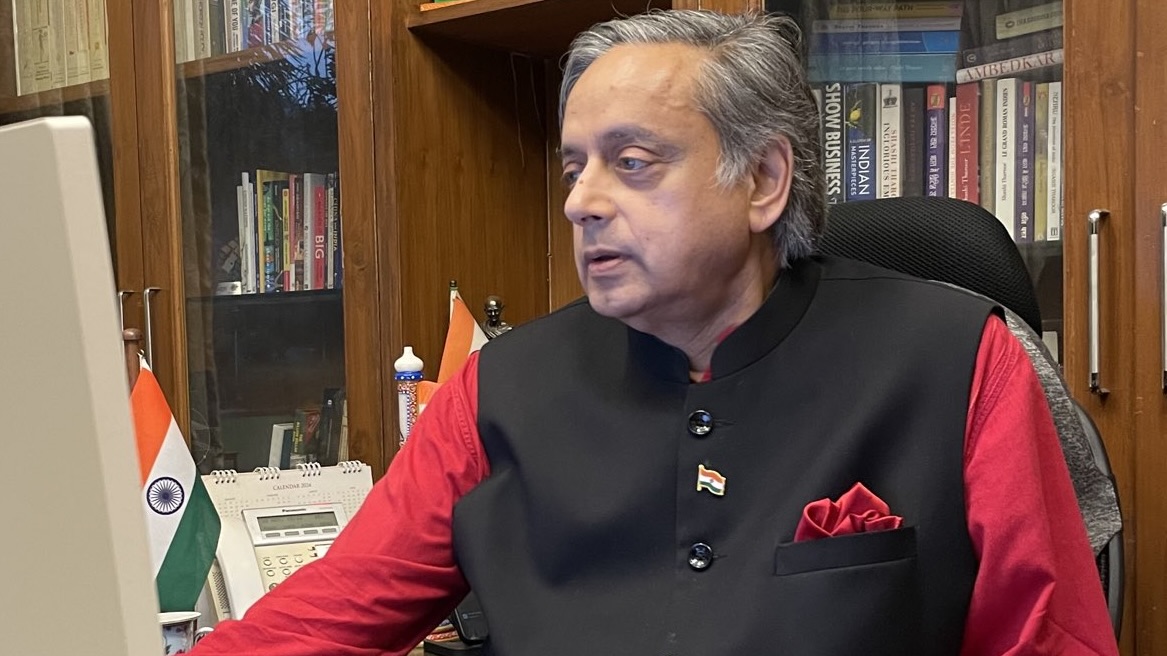Published May 17, 2025 | 12:32 PM ⚊ Updated May 17, 2025 | 1:20 PM

Shashi Tharoor (X)
Synopsis: The Congress is miffed over the Union government including Shashi Tharoor in its global outreach teams, bypassing a list of names the party had provided. However, the party said it would participate in the delegations in the larger national interest.
A political controversy is swirling amid the “paused” Operation Sindoor after the Union government finalised the bipartisan global outreach teams that would travel the world to convey India’s “strong message of zero-tolerance against terrorism”.
Altering the list suggested by the Indian National Congress, the Centre included lawmaker Shashi Tharoor in the team, riling the main Opposition party.
Tharoor did not figure in the Congress’s official list, which had Anand Sharma, Gaurav Gogoi, Syed Naseer Hussain, and Raja Brar.
The list was forwarded to the Centre after the Minister for Parliamentary Affairs, Kiren Rijiju, reached out to the Congress president and the Leader of the Opposition in the Lok Sabha on Friday, 16 May, seeking names for the delegations.
Tharoor, representing Thiruvananthapuram in the Lok Sabha, is the Chairman of the Parliamentary Committee on External Affairs.
The Ministry of Parliamentary Affairs announced the formation of seven All-Party Delegations that will travel to key partner countries — including members of the United Nations’ Security Council — later this month.
The move comes against the backdrop of Operation Sindoor and India’s sustained campaign against cross-border terrorism.
“The delegations, comprising Members of Parliament from across the political spectrum, will carry India’s message of zero-tolerance against terrorism to the international community,” the ministry said in a statement.
The visits aim to reinforce a national consensus on combating terrorism in all its forms and manifestations and to engage with global partners.
Each delegation will be led by a senior parliamentarian, reflecting India’s bipartisan resolve on the issue.
The leaders include Shashi Tharoor (INC), Ravi Shankar Prasad (BJP), Sanjay Kumar Jha (JDU), Baijayant Panda (BJP), Kanimozhi Karunanidhi (DMK), Supriya Sule (NCP), and Shrikant Eknath Shinde (Shiv Sena).
The initiative is expected to amplify India’s diplomatic voice in global forums and strengthen its position in ongoing international counter-terrorism efforts. The delegations will also hold meetings with government officials, lawmakers, and key stakeholders in the host countries.
Tharoor is a former Under Secretary-General of the United Nations.
Meanwhile, it has been pointed out that the government’s decision to mobilise all-party delegations for international outreach reflected a practice followed by the previous UPA and NDA governments on key national issues.
Similar delegations were sent — like in 1994. Prime Minister PV Narasimha Rao had then dispatched a team including Atal Bihari Vajpayee, Farooq Abdullah, Salman Khurshid, E Ahmad, Hamid Ansari, and Manmohan Singh to Geneva to counter a Pakistan-backed resolution at the UN Human Rights Commission.
After the 26/11 Mumbai terror attacks in 2008, the then-Prime Minister Manmohan Singh sent multi-party delegations across continents with evidence of Pakistan’s involvement, which helped build global pressure through forums like the UN Security Council and Financial Action Task Force.
Interestingly, in an X post, Jairam Ramesh, AICC General Secretary for Communications, said that the party had nominated four Members of Parliament to be part of the multi-party delegations.
However, conspicuously absent from the list was senior Congress leader and parliamentarian Tharoor.
Jairam revealed that Parliamentary Affairs Minister Kiren Rijiju had reached out to the Congress President and the Leader of the Opposition in the Lok Sabha on 16 May, seeking names for the delegations.
By noon the same day, the party responded with the names of Anand Sharma, Gaurav Gogoi, Syed Naseer Hussain, and Raja Brar.
The move comes against the backdrop of Congress criticising the Modi government for bypassing Parliament on crucial national security matters.
The party had earlier demanded a special parliamentary session to reiterate the 1994 resolution on Pakistan-sponsored terrorism following the 22 April Pahalgam terror attack and the subsequent Operation Sindoor.
While criticising the ruling BJP for allegedly politicising national security, the Congress said it would participate in the delegations in the larger national interest.
The Open magazine, on Saturday, reported that Rahul Gandhi, the Leader of the Opposition in the Lok Sabha, called up Minister Rijiju and voiced strong opposition to the Centre altering the Congress’s list. Rahul throws a tantrum over inclusion of Tharoor, Manish Tewari in outreach teams, the magazine reported.
I am honoured by the invitation of the government of India to lead an all-party delegation to five key capitals, to present our nation’s point of view on recent events.
When national interest is involved, and my services are required, I will not be found wanting.
Jai Hind! 🇮🇳 pic.twitter.com/b4Qjd12cN9
— Shashi Tharoor (@ShashiTharoor) May 17, 2025
The Union government’s decision to include Tharoor in its proposed all-party parliamentary delegation to brief foreign capitals on Operation Sindoor has raised eyebrows within political circles.
The omission of his name from the Congress list and simultaneous inclusion in the Centre’s list has added to the intrigue.
Reacting to his inclusion, Tharoor said he was honoured to serve the national interest when called upon.
Meanwhile, the Congress’s Kerala unit posted that the country needed globally respected voices like Tharoor’s to correct the Modi government’s diplomatic missteps.
Earlier, amid reports of the AICC cautioning Tharoor for expressing views differing from the party line on India-Pakistan tensions, the Thiruvananthapuram MP clarified he was not at odds with the Congress position.
He defended his earlier remarks on the India-Pakistan ceasefire, asserting they were personal observations drawn from his decades in foreign affairs and UN service.
The AICC had earlier passed a resolution urging the government to explain US President Donald Trump’s mediation claims, which Tharoor felt was unnecessary.
(Edited by Majnu Babu).

